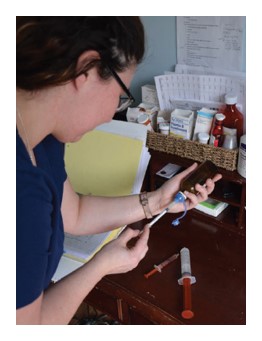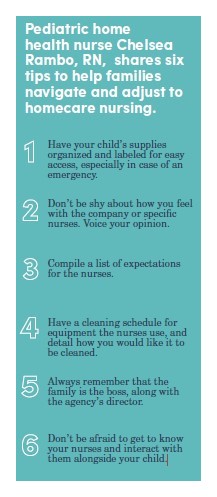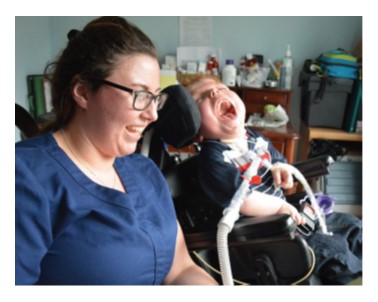Knowing the Patient, Helping the Family: Pediatric Homecare Nursing
“Don’t be sad,” Chelsea reads. “Don’t be blue. There is something everyone can do.” Her patient listens closely as Chelsea’s voice rises and falls with the rhythm of the story until she reaches the end. From start to finish, no more than 10 minutes pass – a brief slice of her typical 12- hour shift. “Interacting and playing with my patients,” Chelsea describes, “that’s the best part of my day. Anything that involves working together and them being happy.” Chelsea recently earned her RN while working for a private home health care agency in the Lancaster area. She specializes in pediatric care, which includes nursing within a patient’s home and at school. Her caseload focuses on five patients, with an additional five she fills in for if another nurse cannot. She averages around 40 hours a week, and daytime shifts occupy her current schedule. “I did nights for a while, and I still pick up night shifts here and there,” the 26-year-old explains. “… My flexibility helps with going on different cases. If they need to switch me, I can do that because I’m trained.” In addition to her homecare nursing work, Chelsea is studying to earn her Bachelor of Science in Nursing (BSN). “I’ve always had a passion for it,” Chelsea says. “I knew I wanted to do something in the medical field. My grandmother had dementia, and she lived with us. When I was in high school, I was her caregiver when I came home from school until my parents got home from work. I really loved that.” Initially, Chelsea pursued a certified nursing assistant (CNA) degree with a focus on dementia and Alzheimer’s skill care. When she went to LPN school, she switched to pediatric care. “I met and interviewed with [pediatric nurses], and I ended up loving it,” she says. “… Just the overall experience with these kids – they are loving, and you get attached to them very easily.” 
Chelsea chose home nursing rather than a medical facility setting because she prefers the continual interaction with the same patients. “It’s not just being in a hospital where I give you meds and treatments,” she says. “It’s holistic – you’re doing everything. You’re helping the parents be able to go to work and the kids to go to school. You help them interact with other kids, and on days off school we’ll play games, listen to music, watch kids’ shows Chelsea credits homecare and pediatrics with helping her become an overall better, more independent nurse. Knowing her patients well is the key and go out in the community.” to homecare nursing because it is up to her to know what to do and how to act if an emergency arises. “If something happens, I need to think fast and know what to do,” she explains. “I can’t call a rapid response or a code blue, like in a hospital setting. … I can always call the office or the families, but if something goes wrong, I can’t just have another nurse help me. I’m very focused on my assessment skills and knowing my patients. I can tell right away if they’re going to get sick.” Chelsea believes in the benefits of homecare nursing for patients andtheir families. No one wants to be in a hospital longer than necessary, and homecare agencies make it possible to come home sooner. “Homecare is blossoming and becoming more of an option for families, especially if they’re coming home on a trache or ventilator,” Chelsea says. “… Patients can be in their own surroundings and with their own family, siblings and pets. It’s more comfortable and familiar. I think they get a better quality of life at home, and it helps the families.” Homecare nursing is not always a smooth and easy transition for families. It can be uncomfortable at first having one or multiple nurses in the home all day and overnight. Building a level of trust and openness is important. “I’m a big people person,” Chelsea says, “but when you go into someone’s house, it can be awkward for them. The big thing I hear is, ‘I’m sorry, I didn’t clean. My house is a mess.’ I always tell them, ‘It is your home, and I’m here for your child.’ I ask them how they like things done. Each house is so different, and each wants things a unique way. I let them know that I’m there to meet their child’s needs, and they can always come to me and not be afraid to approach me if they have a concern or question.” Setting and adhering to boundaries are just as important as trust and openness in homecare. The nurses must follow the medical orders and plan of care set by the patient’s doctor, and that dictates which medications and treatments they can and cannot administer. 
“Some families will ask if we can give them a certain brand of medication or something as simple as essential oils,” Chelsea describes. “If it’s not prescribed by their doctors, I can’t give it to them. As nurses, we have to follow all of the guidelines.” It’s not uncommon for parents to want to do everything – care for their child, work, sleep, go to appointments. But no one is a super parent. “It’s a lot to realize you need help, and it’s a lot to admit that,” Chelsea says. “But then, once they get the help, they’re so thankful. I had a parent tell me that they wouldn’t know what to do without me. … I’m here to help, and they appreciate that.” Chelsea recommends researching multiple homecare agencies to find the right fit. She also says to communicate often with care providers. “Be open, and talk to the nurses and the clinical managers,” she advises. “Get second opinions, and make sure you have your rules set. Know what you like and don’t like, and don’t be afraid to try it, because homecare can be really beneficial for your child.” Bringing benefit and happiness to her patients and their families is what drives Chelsea in her nursing career. Even if it’s simply reading a book aloud, those bright spots of patient interaction inspire her – when smiles flash and medical realities temporarily fade to the background. “The mother of one of my patients said to me that his eyes light up when I come in,” Chelsea says.“It made me so happy to hear that. It’s the best feeling, and that’s why I love nursing. It’s all about how I make them feel. If they’re happy to see me, then I’m doing my job. I’m keeping them happy, healthy and stable.” |

 A pair of genuine smiles beam wide as Chelsea Rambo, RN, reads aloud to one of her five regular home health nursing patients. The realities of tracheostomy tubes and medication schedules give way to the colorful adventures of Pete the Cat. The rhyming children’s tale follows the cartoon feline as he befriends Gus the Platypus, who is different than his other friends.
A pair of genuine smiles beam wide as Chelsea Rambo, RN, reads aloud to one of her five regular home health nursing patients. The realities of tracheostomy tubes and medication schedules give way to the colorful adventures of Pete the Cat. The rhyming children’s tale follows the cartoon feline as he befriends Gus the Platypus, who is different than his other friends.

